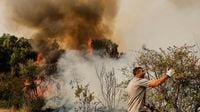Firefighters across southern Europe found themselves in a race against time on Thursday, August 14, 2025, as wildfires raged through Greece, Spain, and Portugal. The region, already battered by weeks of relentless heat and drought, was given a temporary reprieve as winds calmed, allowing crews to intensify their efforts and focus on containing existing fire zones. But authorities warned that the threat is far from over, with extreme temperatures expected to persist and the risk of new blazes remaining dangerously high.
According to the Associated Press, the sudden drop in wind speeds was a much-needed break for fire crews. In Greece, Spain, and Portugal, firefighting aircraft seized the opportunity to step up water drops, shifting their focus from chasing fast-moving fire fronts to reinforcing containment lines around the most active areas. The change in weather conditions offered a rare window, but officials cautioned that the underlying dangers—scorching heat and bone-dry landscapes—were not going anywhere soon.
"Under such conditions, even a single spark is enough to trigger an uncontrollable fire," warned Ioannis Kefalogiannis, Greece's civil protection minister, during a press briefing. "This combination of weather and geographical factors leaves us no room for complacency." His words echoed the anxiety felt across the region, where communities are on edge, watching the skies for smoke and praying for rain.
Spain has been particularly hard hit this season. The country mourned the loss of a 37-year-old volunteer firefighter who died north of Madrid earlier this week, the third reported death linked to wildfires in Spain this summer. The tragedy underscores the high human cost of these disasters. Thousands of residents in the affected region have been forced to evacuate their homes, and as of Thursday, most had yet to return. The emotional toll is palpable, with families displaced and livelihoods threatened by the relentless advance of the flames.
In Greece, a major blaze erupted near the southern port city of Patras, one of the country's most populous urban centers. Thanks to a large-scale deployment of firefighters and equipment, the fire was contained on the outskirts before it could sweep into the heart of the city. However, the situation remains tense. Authorities have arrested three individuals in connection with the Patras fire, suspecting that it may have been deliberately set. The possibility of arson has heightened public concern and prompted a renewed focus on prevention and law enforcement.
High winds, which had previously fanned the flames and complicated firefighting efforts, shifted to different parts of Greece on Thursday. This unpredictable weather pattern has forced civil protection authorities to stay on high alert, bracing for the possibility of a new round of major fires. The threat is not confined to rural areas; urban fringes and popular tourist destinations are also at risk, making the situation even more precarious.
The scale of the crisis has prompted a robust response from the European Union. The EU's civil protection agency has been working around the clock, coordinating cross-border assistance and dispatching firefighting planes and helicopters to the hardest-hit countries. According to the agency, it has already activated emergency assistance 16 times this summer—matching the total number of activations for the entire 2024 wildfire season. Requests for help have come not only from Greece and Spain, but also from Bulgaria, Montenegro, and Albania, underscoring the widespread nature of the threat.
In Albania, wildfires swept through central and southern regions, destroying more than 200 homes before firefighters managed to contain the blazes. The devastation has left many families homeless, and the government has vowed to hold those responsible to account. Prime Minister Edi Rama promised that police would work "day and night" to apprehend suspected arsonists, whom authorities believe may have played a role in starting some of the fires. The determination to pursue justice is strong, but so too is the sense of loss among those who have seen their communities ravaged by fire.
Beyond the borders of the European Union, the Mediterranean's wildfire crisis extended to Morocco, where the largest blaze of the year broke out near Bab Taza in the north of the country. Fueled by strong winds and high temperatures, the fire ripped through dense forest, threatening nearby villages and agricultural land. More than 450 personnel, supported by water-dropping aircraft, were deployed to battle the flames. Their efforts paid off, and the blaze was successfully contained. A second wildfire near Tetouan, further north, was also brought under control, preventing further destruction.
The relentless march of wildfires across southern Europe and North Africa is a stark reminder of the mounting challenges posed by climate change. Hotter, drier summers are becoming the new normal, stretching the resources of fire services and testing the resilience of communities. The European Union's civil protection agency described this summer as one marked by a "high number of catastrophic wildfires," and with the number of emergency activations already equal to last year's total, the scale of the problem is undeniable.
For those on the front lines, the work is exhausting and dangerous. Firefighters, both professional and volunteer, have risked their lives to protect homes, forests, and critical infrastructure. The death of the volunteer firefighter in Spain is a sobering reminder of the perils they face. Meanwhile, residents forced to evacuate are left to grapple with uncertainty, hoping for the best but fearing the worst as they await the all-clear to return home.
Authorities across the region have urged the public to remain vigilant and to heed evacuation orders and safety advisories. With extreme temperatures expected to persist, the risk of new fires breaking out remains high. As Ioannis Kefalogiannis put it, "This combination of weather and geographical factors leaves us no room for complacency." The message is clear: the fight against wildfires is far from over, and everyone has a role to play in preventing further tragedy.
As the sun sets over the scorched landscapes of southern Europe and North Africa, the hope is that cooler temperatures and perhaps a change in the weather will bring some relief. Until then, fire crews remain on high alert, communities are holding their breath, and the world watches as a region battles to protect its people and its natural heritage from the ravages of fire.





